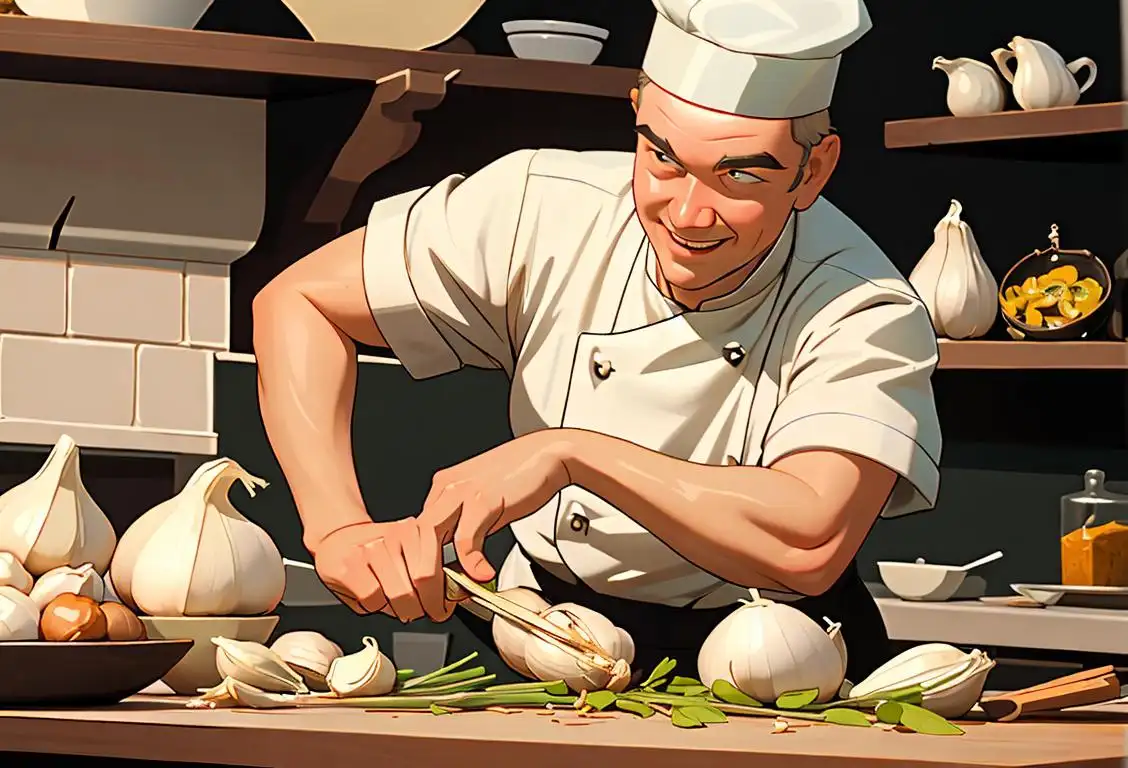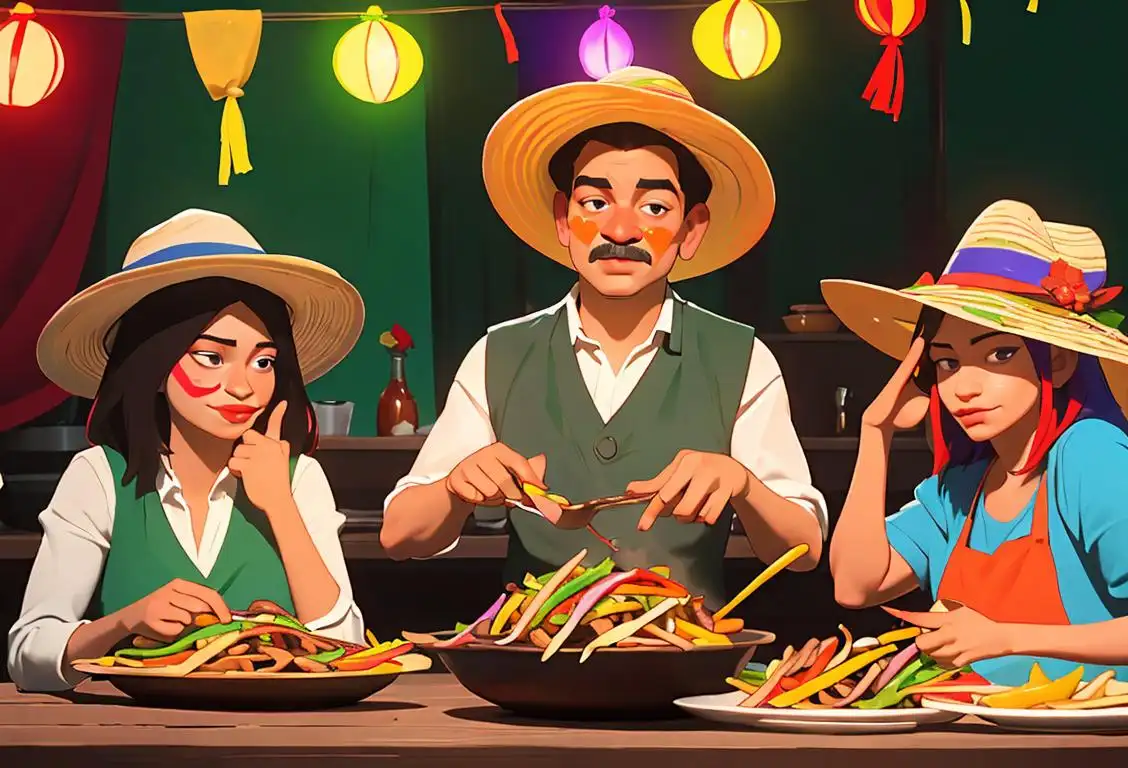National Garlic Day

Garlic, a humble plant with a flavor that packs a wallop. Loved, loathed, and widely featured in vampire lore, this little bulb has its day of glory every year, and it's called National Garlic Day! With a remarkable 5813 online mentions reached, its stinkiest peak popped up on 19th April, 2015. So, grab your breath mints, because we’re about to dive into this deliciously aromatic day.
When is Garlic Day?
It's national garlic day on the 19th April.
History of National Garlic Day
Originating from Central Asia thousands of years ago, garlic has made a name for itself worldwide due its unique aromatic flavour. But when it comes to the internet history of National Garlic Day, we journey to the not-so-distant realm of the mid-2000s, when social media was festering, much like a freshly peeled clove of garlic, and people were becoming more interconnected.
Fun, quirky, and somewhat controversial holidays began gaining traction, and amongst them sprouted National Garlic Day. This pungent plant gathered a cult following, with online mentions souring in number, culminating to a whopping 5813 mentions in the year of 2015, making April 19th an unforgettably fragrant day on the internet.
How to Celebrate National Garlic Day
There are countless ways to celebrate National Garlic Day. You could test your culinary skills by creating garlic-laden recipes at home, swapping out your regular mashed potato for the garlic-infused version. Garlic bread can become a celebratory must, and for the brave, raw garlic eaten straight — not for the faint-hearted, or those planning to socially interact afterwards. The day could also be spent researching the health benefits of garlic or even planting your own garlic bulbs.
Bringing It All Together
Regardless of how you choose to celebrate, National Garlic Day is a wonderful reminder of the rich tapestry of our global culture, where a simple bulb can unite foodies, gardeners, health enthusiasts, and vampire hunters in a celebration of flavor, health benefits, and numerous vampire lore.
History behind the term 'Garlic'
3200 BCE
Ancient Beginnings
Garlic's origin can be traced back to ancient times, around 3200 BCE in Central Asia. It was one of the first cultivated plants in history. Garlic was highly regarded for its medicinal properties and aromatic flavor even back then. Ancient Egyptians, Greeks, and Romans embraced garlic as a culinary ingredient and believed in its various health benefits.
1550 BCE
Garlic in Ancient Egypt
During the reign of the pharaohs in ancient Egypt, garlic held a significant cultural and magical importance. It was consumed by the builders of the Great Pyramid at Giza to increase their strength and stamina. Garlic was also used in religious rituals and offered as a symbol of protection and purification.
9th Century BCE
Garlic in Ancient Greece
Garlic played a pivotal role in ancient Greek society. The famous Greek physician Hippocrates, often referred to as the father of medicine, recognized the medicinal properties of garlic. It was used as a remedy for numerous ailments, including digestive disorders and respiratory issues. Greek athletes would consume garlic before athletic competitions as they believed it enhanced their performance.
1st Century CE
Garlic in Ancient Rome
Garlic continued to be highly regarded in ancient Rome, both for its culinary and medicinal uses. Roman soldiers consumed garlic to boost their endurance during battles. The Roman philosopher Pliny the Elder praised garlic for its ability to ward off various diseases and evil spirits. Garlic became a common ingredient in Roman cuisine, and it was believed to enhance flavor and improve one's health.
6th Century CE
Spread across Europe
Garlic gradually spread across Europe during the Middle Ages. It was cultivated and incorporated into the cuisine of various European regions. Garlic became an essential ingredient in the Mediterranean diet and a symbol of Mediterranean cuisine.
Late 15th Century
Introduction to the Americas
With the arrival of Christopher Columbus in the Americas, garlic made its way to the New World. It was introduced to the indigenous cultures of North and South America, where it eventually became an integral part of their culinary traditions.
18th Century
Garlic's Rise in Popularity
As global exploration and trade expanded, the popularity of garlic grew significantly. It became widely used in regional cuisines worldwide, including Asian, African, and European cooking. Garlic's distinctive flavor and health benefits made it a beloved ingredient in diverse cultures.
Present Day
Garlic's Continuing Legacy
Garlic remains an indispensable part of global cuisine today. It is used in a multitude of dishes, ranging from savory to sweet, and in various culinary traditions. Additionally, garlic's medicinal properties have been extensively studied, with researchers uncovering potential benefits such as reducing blood pressure, boosting the immune system, and combating certain types of cancer.
Did you know?
Did you know that despite its pungent aroma, garlic is actually known as a 'natural Viagra'? It’s true, this flavorful bulb can reportedly boost the libido. So perhaps National Garlic Day can be a spicy date night in the making, bad breath notwithstanding.Tagged
food celebration gardening history online trend cooking garlic flavor quirky national day health benefitsFirst identified
18th March 2015Most mentioned on
19th April 2015Total mentions
5813Other days
Garlic Day
Fajita Day
Senior Citizens Day
Lasagna Day
Dumpling Day
China Day
Martini Day
Vodka Day
Chili Day
Hot Chocolate Day








